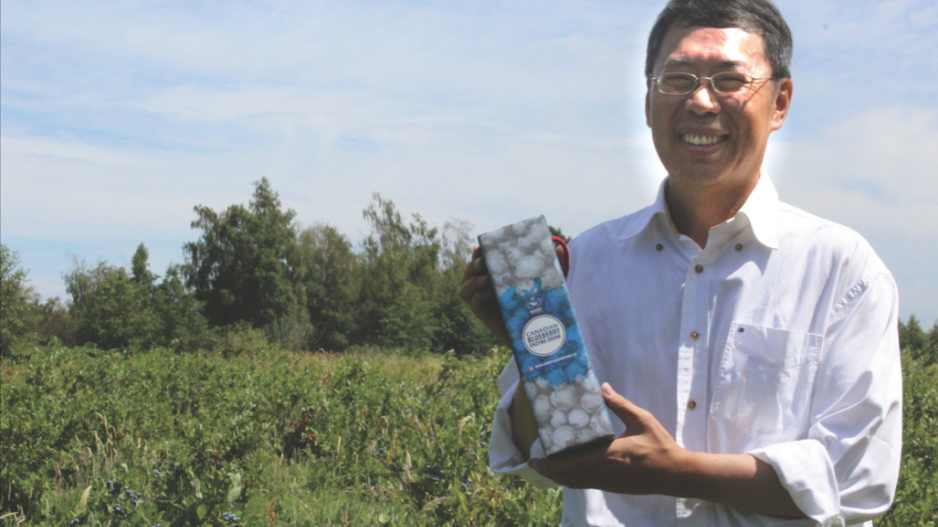A Richmond-based organic farmer wants to capitalize on the growing reputation of B.C. blueberries by increasing their shelf life to allow more consumers in Asia to enjoy the taste – and health benefits – of the fruit.
Fred Liu, founder and owner of Lohas Farm Inc., has been in the business for roughly a decade and has been successful in selling to consumers and distributors in markets like Taiwan and mainland China.
But he said that B.C.’s short blueberry season and the fruit’s limited shelf life make business at the small farm a constant guessing game.
That’s why Liu, who worked in the IT industry in Taiwan before moving to Canada at the turn of the millennium, turned to technology for inspiration and a solution. Employing a fermentation process invented in Japan and popularized in Taiwan, Liu created a non-alcoholic enzyme drink with a five-year shelf life that extends the product’s reach further into the Asian market, where refrigerated distribution networks can be rare.
“When you produce just the fruit itself, you are always at the mercy of the weather,” Liu said. “In 2009, we had a great harvest because we had great weather. But in 2015, the massive drought severely cut into everyone’s production. Creating a product that’s value-added makes sense, because it reduces the [production] risks that are out of our control.”
Blueberries have enjoyed a raised profile in Asia – especially in the Chinese-speaking world – in recent years. TV shows in those markets increasingly focus on healthy products as people, having attained higher income levels, turn to lifestyle-related items for their consumer needs. Blueberries – especially Canadian blueberries – have caught audiences’ attention due to their high antioxidant content.
The boom was aided by an agreement between Canada and China in 2015 that allowed B.C. blueberries to enter the Chinese market starting in 2016. This year, China reduced its tariffs on Canadian blueberries to 15% from 30%. The provincial government estimates that the fruit’s annual export can now be as much as $65 million.
The current retail price of a 500-gram bag of frozen B.C. blueberries in Asia can be more than $10; fresh berries – requiring air freight – cost significantly more.
“What the consumers tell us is that they don’t feel the blueberries from Chile or New Zealand taste quite as sweet and as tasty as B.C.’s berries,” Liu said.
He added that his farm’s e-commerce model allows it to send orders directly to the doors of consumers in the Taiwanese market via air freight.
“It’s an extremely health-conscious market, and Canada’s image is one of nature, cleanliness and purity. So it’s beneficial – especially for a small, family-operated organic farm like ours.”
Liu’s production, generated from two locations at only about 10 acres combined, is around 30,000 pounds annually. The product always sells out, he said, although only about 6,000 to 7,000 pounds are sold fresh; the majority of the rest is sold frozen. While frozen berries have a shelf life of two years, Liu said the enzyme drink more than doubles that, allowing more time for more consumers to be exposed to the product.
He added that marketing enzyme drinks in Asia is easier because making them from fruits is a common practice there. The industry in mainland China is growing so fast that Shanghai hosted its first enzyme-specific trade show in 2015. It attracted drink producers from throughout Asia.
Liu, representing Lohas, attended last year and will make the trip again this fall. He is the only Canadian representative and the only one making the drink with B.C. blueberries.
Before Liu attended the show, about 4,000 of his initial run of 6,000 bottles in 2015 sold in the Chinese market. Last year, after attending the show, Lohas’ new Berry Legend brand of drinks received an order request of 3,000 bottles from one urban distributor (in Guangzhou) alone. At least three others (Shanghai, Chongqing and Shenzhen) are looking at similar numbers.
Liu also wants to sell enzyme drinks in the B.C. market, but he said local consumers, unlike their Asian counterparts, are thus far largely unaware of enzyme drink products.•




